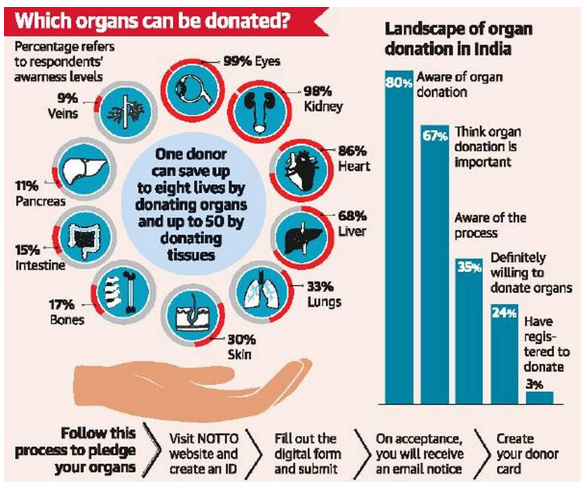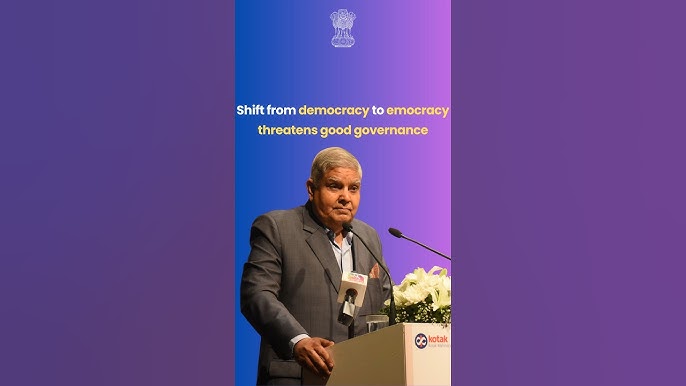- Courses
- GS Full Course 1 Year
- GS Full Course 2 Year
- GS Full Course 3 Year
- GS Full Course Till Selection
- Online Program
- GS Recorded Course
- NCERT (Recorded 500+ Hours)
- Polity Recorded Course
- Geography Recorded Course
- Economy Recorded Course
- AMAC Recorded Course
- Modern India, Post Independence & World History
- Environment Recoded Course
- Governance Recoded Course
- Science & Tech. Recoded Course
- International Relations and Internal Security Recorded Course
- Disaster Management Module Course
- Ethics Recoded Course
- Essay Recoded Course
- Current Affairs Recoded Course
- CSAT
- 5 LAYERED ARJUNA Mentorship
- Public Administration Optional
- ABOUT US
- OUR TOPPERS
- TEST SERIES
- FREE STUDY MATERIAL
- VIDEOS
- CONTACT US
Critical shortage of organ donations in India
Critical shortage of organ donations in India
09-08-2023

Latest Context:
Presently, India is suffering from high shortage of organ donations and this has led to a situation, where thousands of patients are waiting for transplants.
More about the news:
- Recently, the central government has modified National Organ Transplantation Guidelines, allowing those above 65 years of age to receive an organ for transplantation from deceased (dead) donors.
- Basically, Transplantation of Human Organs Act, 1994 provides various rules and regulations for the removal of human organs and their storage. This act also regulates the transplantation of human organs.
Key provisions of the Transplantation of Human Organs Act, 1994 include:
- Regulation of Organ Transplants: The act regulates the removal, storage, and transplantation of human organs and tissues for therapeutic purposes. It establishes a framework for the legal and ethical aspects of organ transplantation.
- Authorized Hospitals and Medical Practitioners: The act designates hospitals as "authorized hospitals" that are permitted to conduct organ transplantation procedures. Similarly, it designates medical practitioners as "authorized medical practitioners" who are qualified to perform organ transplantation procedures.
- Requirement of Authorization Committee: The act mandates the establishment of ‘authorization committees’ at the state and central levels. These committees are responsible for reviewing and granting approvals for organ transplantations. They ensure that the transplantation is conducted in accordance with the law and ethical standards.
- Categories of Relatives: The act specifies the categories of relatives who can legally donate organs to patients. For instance, organs can be donated by parents, siblings, children, and other near relatives.
- Prohibition of Commercial Dealing: One of the main objectives of the act is to prevent the commercial trade of human organs. It prohibits the sale and purchase of organs, making commercial organ trafficking illegal.
- Preservation of Organs: The act mentions procedures for the preservation of donated organs to maintain their viability and increase the chances of successful transplantation.
- Penalties for Violations: The act defines penalties for violations, including unauthorized removal of organs, contravention of the act's provisions, and illegal commercial dealings. Penalties can include imprisonment and fines.
- Consent and Authorization: The act emphasizes the importance of informed consent from the donor or their relatives for organ transplantation. It also requires that the authorization for transplantation be obtained in a prescribed manner.

About the status of organ donation in India
- Presently, almost 3 lakh patients are on the waiting list for organ donations in India and the supply of organ donors is very less as compare to demand.
- Around 20 people die daily due to shortage of organs.
- The number of donors including both living and deceased, have shown very slow growth over the years. From 6,916 donors in 2014, the number has increased to around 16,041 donors in 2022.
- Living donors forms the majority in India as they account for almost 85% of all donors in India.
- States like Telangana, Tamil Nadu, Karnataka, Gujarat and Maharashtra are on the top in terms of deceased organ donors, while Delhi-NCR, Tamil Nadu, Kerala, Maharashtra, and West Bengal are on the top in case of living donors.
Challenges regarding organ donation in India are:
- Lack of Awareness: A significant challenge is the lack of awareness about organ donation and its importance. Many people are not fully informed about the benefits of organ donation.
- Myths and Misconceptions: There are various myths and misconceptions surrounding organ donation in India, such as fears that organ donation could impact one's afterlife or lead to bodily disfigurement. Addressing these misconceptions is essential to increase public acceptance.
- Religious and Cultural Beliefs: India is a diverse country with a multitude of religious and cultural beliefs. Some of these beliefs may be opposed to organ donation, posing challenges in promoting the concept across all communities.
- Trust in the Healthcare System: A lack of trust in the healthcare system can deter potential donors from participating. Concerns about misuse of organs, organ trafficking, and unethical practices can make people hesitant to donate.
- Family Consent: In India, family consent is often required for organ donation, even if the deceased had expressed a desire to donate their organs. If family members are not aware of the deceased's wishes or are unwilling to give consent, it can hinder organ donation.
- Infrastructure and Resources: Adequate infrastructure and resources are essential for organ transplantation procedures. Many hospitals lack the necessary facilities, trained medical staff, and equipment for successful organ transplant surgeries.
- Legal and Regulatory Challenges: While the Transplantation of Human Organs Act, 1994, and subsequent amendments provide a regulatory framework, there can still be challenges related to enforcement and interpretation of the law.
- Shortage of Organ Procurement Organizations (OPOs): Organ Procurement Organizations are responsible for identifying potential donors, obtaining consent, and coordinating the organ retrieval process. The limited number of OPOs in India can hinder the efficient collection of organs from deceased donors.
- Organ Trafficking and Commercialization: Despite legal provisions, cases of illegal organ trafficking and commercialization still exist. These activities can deter individuals from participating in organ donation due to concerns about exploitation.
Conclusion:
Addressing these challenges requires a multi-faceted approach that involves raising awareness, improving healthcare infrastructure, enhancing legal enforcement, collaborating with religious and community leaders, and promoting a culture of organ donation that prioritizes ethical practices and the well-being of both donors and recipients.
Must Check: IAS Coaching Centre In Delhi



